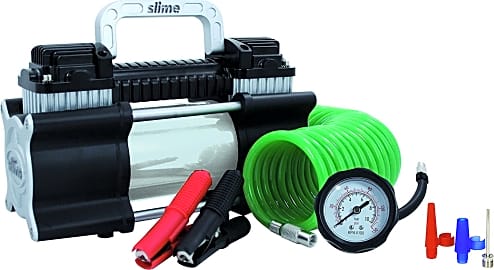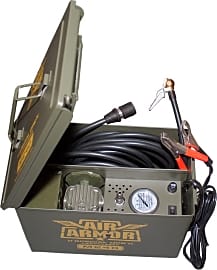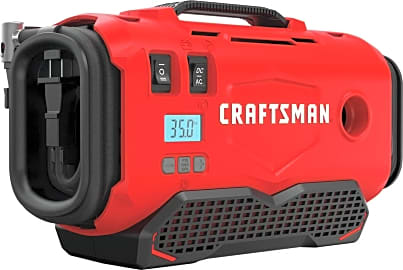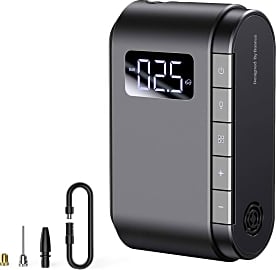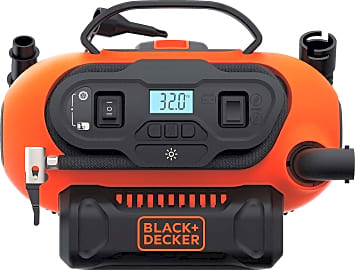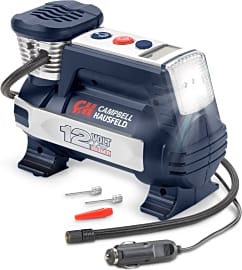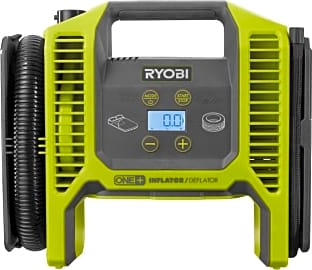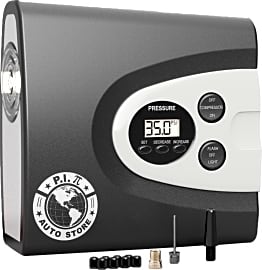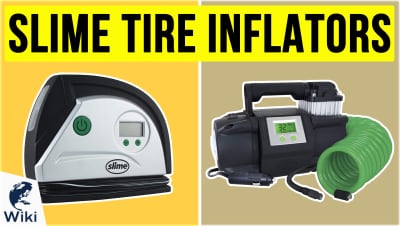The 10 Best Inflators

This wiki has been updated 43 times since it was first published in June of 2015. When you keep one of these handy electric inflators around in case of emergencies, you won't have to worry about getting stuck on the side of the road with a flat tire on your bicycle, motorcycle, car or truck. Many of our options are equipped with extra-long hoses and some also come with adapters for inflating air mattresses, pool toys, rafts and even sports equipment. When users buy our independently chosen editorial recommendations, we may earn commissions to help fund the Wiki.
Editor's Notes
April 28, 2021:
The Viair 77P seemed to be widely unavailable at the time of this writing, and while that might’ve been due to a temporary supply shortage, we decided to swap it out with the Viair 84P, just to be safe. Admittedly, the 84P is said to be a bit louder than the 77P, and it doesn’t offer as much reach, but it’s also more powerful and still widely considered to be a great inflator. Some users will also prefer its push-on chuck to the twist-on hardware the 77P is outfitted with.
The Wondesha Portable also seemed to be missing in action, and was eliminated from our list as a consequence, but we wanted to make sure that our rankings still included a similarly small option. So, we added the Baseus CRCQB03. This unit isn’t powerful enough to service big truck tires and similar loads, but it does boast one of the sleekest designs in the category, not to mention one that’s impressively compact, with a housing that’s slighter than some smartphones. It comes with a trio of nozzles – so you can inflate a basketball as easily as a car tire – and it also doubles as a flashlight.
The TireTek RX-1 also lost its place during this round, and we filled that spot with the Craftsman CMCE520B, which – like the DeWalt DCC0320IB – can be powered by a 120-volt AC outlet, 12-volt DC outlet or 20-volt lithium-ion battery. Unfortunately – also like the DeWalt DCC0320IB – it’s sold as a bare tool, so batteries will need to be purchased separately. Manufactured by sister companies, a three-year limited warranty is one more similarity that these two options share.
If the Slime 40026 is one option on our list that particularly caught your eye, we can’t blame you. Slime has an excellent reputation in the inflator space, and for good reason, and as is such we’ve even put together a specialized list of Slime tire inflators. If your primary purpose for making this purchase is to help fill bike tires, then you might also be curious about our list of CO2 tire inflators.
February 27, 2020:
During this round of updates, we eliminated the DBPower AP3004, P.I. Auto Store PIAS015, Suaoki DC Digital and Tcisa Portable, all due to availability issues. We also replaced the Black & Decker ASI500 with its successor the Black & Decker BDINF20C, and made a number of new additions including the DeWalt DCC020IB – a pricey-but-impressive offering that can be powered by brand’s well-reputed, 20-volt batteries; the Wondesha Portable – a compact model with a smart design that charges via USB; and the Ryobi P747 – which doesn’t have as many features as the DeWalt, but comes at half the price.
A few things to think about as you shop:
Output: You’ll want to pay close attention to each unit’s rated output volume, as the metric speaks directly to the length of time it’ll take the inflator to fill a tire. Many companies have done their customers a service by explaining their offering’s capabilities in layman’s terms: how long it takes to fill an average tire. The DeWalt DCC020IB, for example, can fill a common car tire in less than five minutes, while the Air Armor M240 can fill a 35-inch truck tire in the same amount of time. Speaking of truck tires, if you're looking for an inflator that’s suitable for larger vehicles, you’ll also want to pay attention to each unit’s maximum operating pressure, as it disqualifies smaller units as practical options. The Wondesha Portable and P.I. Auto Store Premium are both options that shouldn’t be counted on for filling anything larger than a car tire.
Gauges: This might seem insignificant, but the type of gauge an inflator’s equipped with significantly impacts its styling and the user experience it offers, so it’s worth paying some attention to. While digital gauges that display single-decimal-place values are quite common in this category, fans of tried-and-true, analog-style gauges will want to consider options like the Air Armor M240 and Slime 40026, or the Viair 77P – which features a smart-looking, illuminated, linear analog gauge. One advantage of some digital gauges is that they have the option of displaying pressure using multiple units of measurement. For example, users of the Wondesha Portable can toggle through four different units of measurement – which is nice if PSI isn’t the metric you’re most familiar with.
Reach: A host of inflators won’t do you any good if none of them have an air hose that can reach the tire in question, so make sure that the option you're selecting – based on a combination of the its hose length and power-cord length – can reach all your car’s tires without problem. Battery-powered models like the Ryobi P747 and DeWalt DCC020IB can save you a lot of guess work when it comes to this, while corded options like the Slime 40026 and Air Armor M240 – which feature 30- and 25-feet hoses, respectively – are more than adequately equipped to reach all four of a vehicle’s tires with ease.
Special Honors
Pro Bike Tool It won't be a viable solution when a nail rips through the rubber on your pickup truck, but for cyclists looking for a lightweight solution that they can keep in tow during adventures and commutes, a CO2 inflator like the ones offered by Pro Bike Tool is an affordable insurance policy worth investing in. The company also stocks several alternate bike-related accessories. probiketool.com
DeWalt DXCMV5048055 Inflators like the ones listed on this page are great for roadside emergency kits and users with limited storage space, but whenever you're ready to get down to decking out your garage with the grandest gear possible, nothing beats a big, freestanding unit like this one. With an 80-gallon capacity, it can deliver up to 175 CFM, which is enough to run multiple pneumatic tools simultaneously. dewalt.com
Benefits Of An Inflator
This makes it easier to alert other motorists to your presence when you're on the side of the road.
Maintaining proper air pressure in one's tires is crucial for getting the most miles per gallon out of a gas tank. In fact, experts say that for every pound drop in a tire's pounds per square inch (PSI) of air pressure, the mileage of the car goes down by 0.4 percent. Keeping an inflator on hand will help drivers boost their PSI to proper levels on the go without the help of a professional mechanic. Inflators are designed to fit in most vehicles without taking up too much space. Some weigh as little as six pounds, so anybody can lift and move them as needed.
When someone is driving on a leaky tire and doesn't have time to patch up the hole, or isn't near a mechanic, he or she needs to add air frequently. Fortunately, most inflators run on 12-volt batteries that draw power from a vehicle's DC port. They are also designed to recharge in just a few hours when they're plugged into an AC power supply. Depending on the maximum PSI produced, some inflators can even fill up oversized truck tires. They are also great for active people who spend their weekends hiking or camping.
Some inflators come with nozzle adapters, allowing one to put air in car tires, bicycle tires, and even basketballs. Good samaritans who want to help people on the side of the road with deflated tires should get an inflator with an extra-long reach so it can connect between the two cars.
There are several important safety tips for driving after dark that prevent accidents, but in the unfortunate event that an accident does occur, having an inflator with reflectors is handy. This makes it easier to alert other motorists to your presence when you're on the side of the road.
How To Avoid A Flat Tire
An inflator is an important part of any fix-it kit for drivers who like to patch up their own tires. But the ideal situation is to reduce the possibility of a flat tire in the first place. It's a good idea to visually check one's tires about once a week to catch any slow leaks. Not all flat tires come from nails on the road; some result from a tire that was leaking for a long time, and couldn't handle a sudden 200-mile road trip. That being said, sharp items like nails in the road are one of the top causes of flat tires, which is why drivers should avoid taking their vehicles down torn up alleys where people tend to dump construction items.
There's one cause of flat tires that has nothing to do with driver error and that's vandalism.
There's one cause of flat tires that has nothing to do with driver error and that's vandalism. Anyone from an angry ex-employee to a mischievous teenager might slash a person's tire, so drivers should always park their cars in well-lit areas, preferably where they can keep an eye on them. When a tire becomes worn out in one area, this also causes it to tear open. So, in addition to regularly checking air pressure, drivers should also check to make sure their tires are wearing out evenly.
Making lots of fast stops and starts are some of the main reasons tires wear out. For this reason, drivers should always accelerate and come to a stop slowly. Unfortunately, even the best drivers can't compensate for a bad tire tread, so when purchasing tires, buyers should look for ones that have an extra thick tread and that's puncture resistant.
Safety Tips If You're Stranded On The Highway
Most people associate car accidents with moving cars, but even those at a complete stop are at risk of a collision. Being stranded on the side of a highway is very dangerous; cars are speeding by at 60 or 70 miles per hour, sometimes only a few feet away. Everyone should keep reflectors in their trunk in case they're ever stranded at night, so other cars can see them. They should turn on their emergency flashers, too. Depending on the emergency flasher laws in one's state, they may be allowed to drive with flashers on, while still seeking a safe place to pull over.
People exiting their vehicle should always get out on the side away from passing traffic.
Driving through long stretches of highway with very few off ramps can be especially dangerous. People should take note of the name of the last exit, so they can explain their location when they call for assistance. If a driver doesn't feel safe when broken down in a particular area, they should stay in their car with their windows rolled up and their doors locked. Should anyone suspicious approach the car while they're stranded, they should repeatedly honk their horn and flash their lights to catch the attention of passing vehicles.
People exiting their vehicle should always get out on the side away from passing traffic. People should never stand directly behind or in front of their car, especially at night, since other cars might run into it. If possible, people should drive their car very slowly to a large shoulder, or off the highway entirely. Even on a flat tire, a vehicle can still move a short distance at a slow speed.


